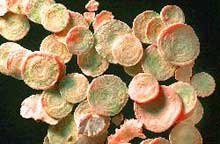Process Engineering
This special field revolves around processes for modifying material properties (milling, cooling), composition (filtration, distillation) and type (oxidation, hydration).
Valuable information is available on a broad range of technologies including material separation, laser processes, measuring techniques and robot engineering in addition to testing methods and coating and materials analysis processes.

INEEL, California groups unveil unique natural gas liquefaction facility
A first-of-its-kind, small-scale natural gas liquefaction facility designed by scientists at the U.S. Department of Energy’s Idaho National Engineering and Environmental Laboratory was unveiled today by Pacific Gas and Electric Company officials in Sacramento, Calif.
Other significant partners in the pioneering liquefied natural gas (LNG) facility effort include the California Energy Commission, Sacramento Air Quality Management District, SoCal Gas Company and South Coast Air Quality M

Commission to invest Euro 700 million in nanotechnology research
Machines not bigger than a molecule will one day surf our blood stream, search and destroy infected tissues, and heal our wounds. This is just one of the applications of nanotechnology. EU Research Commissioner Philippe Busquin will chair an information day on nanotech new frontiers in Grenoble, France, on 14 June 2002. Nanotech research is still in its start-up phase, and will be far more effective if co-ordinated and supported at EU level. The Commission will therefore allocate € 700 million to nan

Pioneering research at Loughborough University could reduce mobile phone emissions into the body by up to 85%
Loughborough University’s Centre for Mobile Communications Research (CMCR) has made some major breakthroughs in its antenna technology that could enable safer communication for all.
Using their work associated with GPS (Global Positioning System) technology, researchers have managed to reduce emissions into the body by as much as 85%. The CMCR achieved its breakthrough in antenna designs through innovative laser technology and super computing modelling techniques. This puts the University i

Fossils Point the Way to Black Gold
Drilling for oil is expensive – and only too often unsuccessful: in 80 to 90 per cent of all attempts the drill head ends up in worthless sediment rather than hitting the black jackpot as intended. In this way, with every unsuccessful drilling, companies squander several million euros. Yet there is an alternative: the use of tiny fossilised single-celled organisms can reveal to the expert where prospecting for oil is worth while, a dying art at which only a few specialists worldwide still remain prof

The ink is mightier than the pen – against forgery
Inks which cannot be photocopied – to confound bank-note forgers – are exciting printers of most of the world`s major currencies. A team from colour chemistry, led by Professor David Lewis and Dr Long Lin, has created an ink which changes colour when copied or scanned, to prevent forgers colour matching banknotes.
“There are already hundreds of security measures in place for banknotes,” said Professor Lewis. “But these don`t stop forgeries – some estimates put the number of forged banknotes

New study shows that rare-earth magnets could displace "conventional" types in high-power electric drives for vehicles
British consultants, Oakdene Hollins, have published a technical and commercial study of how an electrolytic production process developed at Cambridge University could transform prospects for the exploitation of rare-earth magnets. The process is already attracting development funds from the US Navy.
Rare-earth permanent magnets offer significantly improved performance characteristics over those of conventional magnets, but are more expensive. Although costs have fallen over recent years due